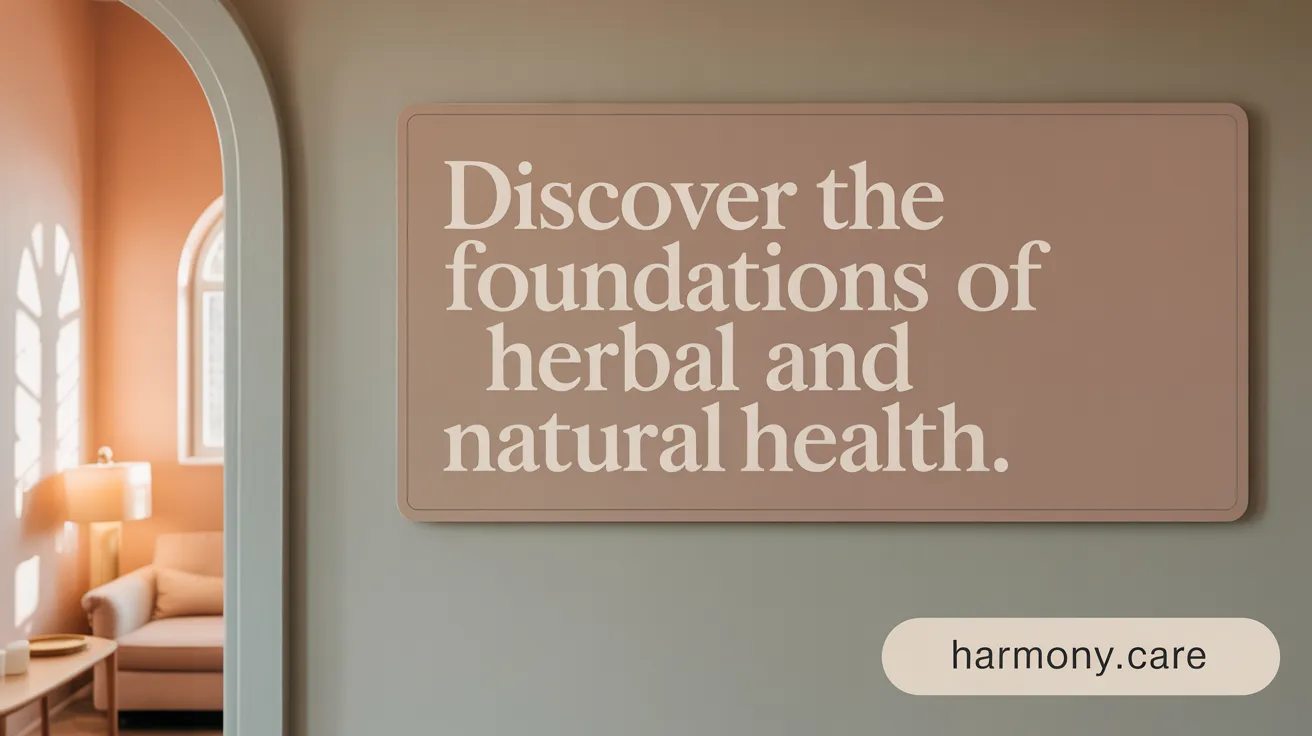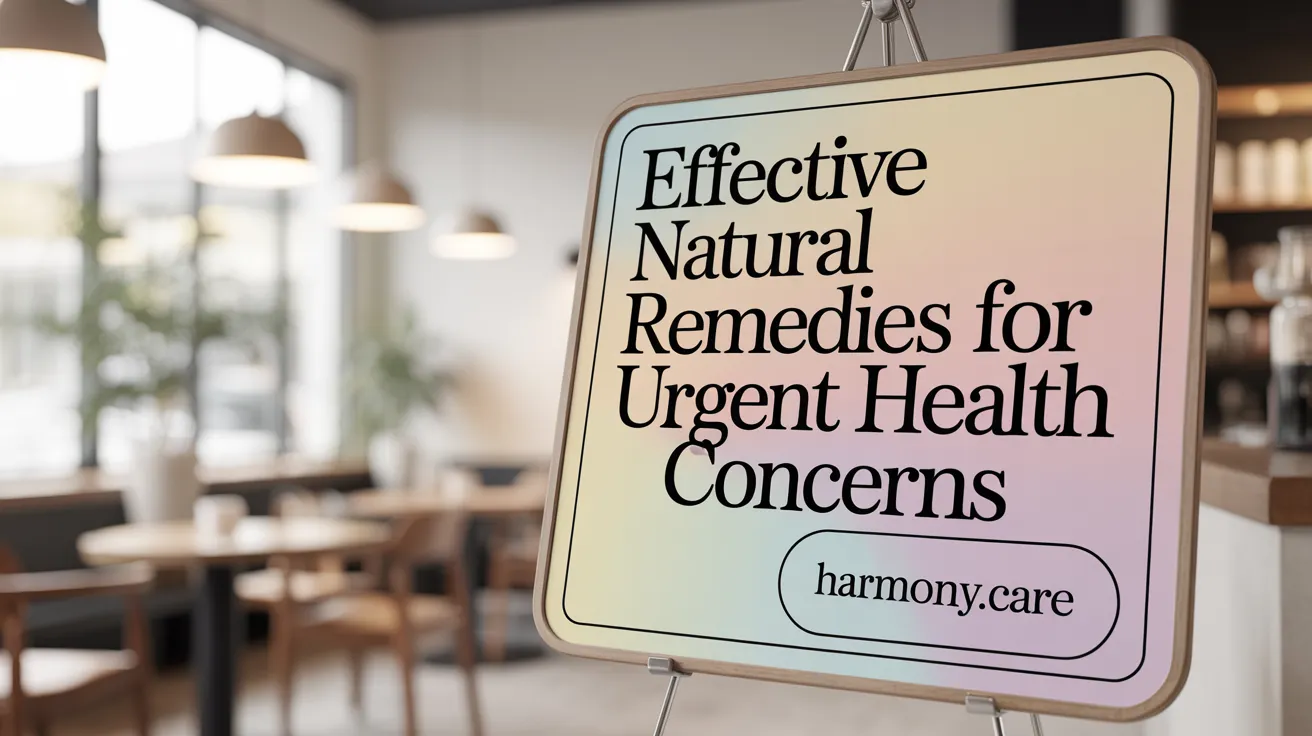Introduction to Herbal and Natural Approaches in Urgent Care
Herbal and natural remedies have been integral to health and medicine for thousands of years, offering holistic, plant-based solutions that complement conventional therapies. This article explores how these natural approaches can be safely and effectively integrated into urgent care scenarios, addressing common acute illnesses and injuries while emphasizing evidence-based practices and patient safety.
Fundamentals of Herbal and Natural Health Approaches
 Herbal and natural health practices are rooted in traditional knowledge and cultural practices that emphasize the use of plants and holistic methods to support health and prevent illness. These approaches include herbal medicine, naturopathy, and systems like Traditional Chinese Medicine, all of which rely on natural substances and principles of balancing the body's systems.
Herbal and natural health practices are rooted in traditional knowledge and cultural practices that emphasize the use of plants and holistic methods to support health and prevent illness. These approaches include herbal medicine, naturopathy, and systems like Traditional Chinese Medicine, all of which rely on natural substances and principles of balancing the body's systems.
Herbal remedies often involve using whole plants or plant parts in various forms such as teas, capsules, tinctures, or topical applications. The core principle is to harness the healing properties of plants to stimulate the body's own recovery processes. This philosophy recognizes that health is influenced by physical, emotional, and spiritual factors, advocating for personalized care tailored to each individual's needs as described in herbal medicine uses.
However, safety and efficacy are paramount. Unlike conventional medicines regulated by agencies like the FDA, herbal products are considered foods and lack strict testing, manufacturing, and labeling standards. To ensure safety, professional guidance from qualified herbalists or healthcare providers is highly recommended. They can help avoid adverse effects, herb-drug interactions, and contamination issues as detailed in using herbs safely.
In addition to supporting healing, herbal and natural approaches serve an important role in promoting overall wellness. They encourage preventative care, stress reduction, and a harmonious relationship between the body, mind, and environment. When used thoughtfully and under professional supervision, these methods can complement conventional treatments, offering a holistic pathway to health, as summarized in embracing holistic urgent care.
By integrating cultural traditions with scientific research, herbal and natural health practices provide diverse options for those seeking alternative or supplementary ways to maintain health, emphasizing safety, personalized care, and respect for natural healing processes as discussed in evidence-based complementary and alternative medicine.
Natural Remedies for Common Urgent Health Issues
 When faced with urgent health concerns like colds, flu, sinus infections, bronchitis, or minor injuries, many turn to natural remedies to ease symptoms and support recovery.
When faced with urgent health concerns like colds, flu, sinus infections, bronchitis, or minor injuries, many turn to natural remedies to ease symptoms and support recovery.
Effective approaches start with staying well-hydrated using warm liquids such as herbal teas, broths, or chicken soup. These fluids help soothe inflammation, thin mucus, and promote easier breathing. Steam inhalation with eucalyptus or peppermint oil can decongest nasal passages, while saline nasal rinses using a Neti Pot or similar device effectively clear sinus congestion.
Gargling with warm salt water or honey can provide relief for sore throats, thanks to their antibacterial and soothing effects. Applying topical mentholated rubs or hot/cold packs can alleviate muscle pain and reduce discomfort in minor injuries (holistic approaches to musculoskeletal pain).
Nutritional support also plays a role. Foods rich in vitamin C, including oranges, berries, and greens, along with herbal supplements like elderberry, garlic, and echinacea, may help boost the immune response and potentially shorten illness duration. However, it is important to use these supportively and under medical guidance, especially for serious infections (guidance for safe herbal remedy use).
Additional supportive practices such as resting adequately, keeping warm, elevating the head during sleep (prevent acid reflux during sleep), and avoiding overexertion contribute to faster recovery. While natural remedies can be valuable complements, any signs of severe or worsening symptoms warrant prompt medical attention to prevent complications (when to visit the ER or urgent care).
In summary, adopting a holistic approach that combines hydration, herbal therapies, proper nutrition, and rest can effectively manage many urgent but minor health issues, supporting the body's innate healing abilities while ensuring safety and timely medical intervention when needed (holistic urgent care and herbal medicine).
Safety, Evidence, and Guidelines for Herbal Treatments

What safety considerations and research evidence should be taken into account when using herbal and natural treatments?
When using herbal and natural treatments, safety must be a primary concern. Herbs can cause allergic reactions, interact with prescription medications, or have inherent toxicity at high doses. Contamination with pesticides, heavy metals, or adulterants is also a risk, especially with unregulated products. Misidentification of plant species or variability in active ingredient levels can lead to unexpected effects (Herbal remedies overview, Herbal medicine).
While many herbs have a long history of traditional use and some are supported by scientific research, the strength of evidence varies. For example, St. John’s Wort has shown efficacy for mild depression, and echinacea may help reduce cold duration, but comprehensive clinical trials are necessary to confirm safety and effectiveness (Common herbal supplements, Herbal remedies overview). Certain herbs, such as Ephedra or Aristolochia, are known to be toxic and are discouraged (Risks of herbal remedies).
To ensure safety, consumers should choose products with quality certifications like "USP Verified" or "ConsumerLab.com Approved," which indicate quality testing and purity (FDA regulation of herbal supplements, Certification marks for herbal products). Regulatory oversight by agencies such as the FDA is limited for herbal supplements, making it essential to buy from reputable sources (FDA regulation of medicines).
Furthermore, consulting healthcare providers before starting herbal remedies is crucial, especially for individuals with chronic conditions, those on medications, pregnant or breastfeeding women, and upcoming surgical procedures (Consulting healthcare providers about herbs, Discussing herbal supplements with healthcare providers, Herbal use warnings for children and elderly). Proper labeling, adherence to good manufacturing practices, and ongoing pharmacovigilance help prevent adverse events (Labeling restrictions of herbal supplements).
In sum, while herbal treatments can be beneficial, they require careful attention to safety protocols, a reliance on credible research, and professional guidance to minimize risks and maximize health benefits (Guidance on herbal supplement use, Using Herbs Safely).
Integrating Herbal and Holistic Therapies in Urgent Care

How can herbal remedies and holistic treatments be integrated effectively into urgent care scenarios?
Integrating herbal remedies and holistic treatments into urgent care requires a carefully balanced approach that combines evidence-based conventional medicine with supplementary traditional therapies, under the guidance of trained healthcare professionals. Effective integration involves establishing standardized herbal products, standard protocols, and safety measures—such as screening for herb-drug interactions and potential toxicity—to ensure patient safety.
Formal inclusion of traditional medicine practices in medical education and clinical protocols can facilitate communication and appropriate use during emergencies. Additionally, fostering open communication about herbal use can help mitigate risks and optimize therapeutic outcomes in urgent situations.
Overall, when properly managed and evidence-based, holistic approaches can support immediate symptom relief and promote overall patient wellbeing alongside standard urgent care interventions.
How do Traditional Chinese Medicine (TCM) and other complementary therapies apply in urgent health situations?
Traditional Chinese Medicine (TCM) and other complementary therapies have been historically used in emergency and acute health situations, such as coma and neurological injuries. Techniques like ear blowing, nasal insufflating therapy, and acupuncture at specific points are employed to promote consciousness recovery, modulate the autonomic nervous system, and enhance neurological function.
For example, ear blowing stimulates the vagus nerve to promote arousal, while nasal delivery of medicines bypasses the blood-brain barrier for neurological conditions. Moxibustion and acupuncture are also used to regulate the body’s balance and support recovery by influencing the gut-brain axis and brain homeostasis.
Although these methods offer promising adjuncts to conventional urgent care, more rigorous scientific research is needed to confirm their safety and efficacy in emergency scenarios.
Herbal First Aid and Targeted Natural Symptom Treatments
Essential Medicinal Herbs for First Aid
When faced with minor injuries or symptoms, certain herbs can be effective in providing immediate relief. Calendula and arnica are well-known for their anti-inflammatory and healing properties, making them suitable for treating bruises, cuts, and skin irritations. Aloe vera offers soothing effects for burns and sunburns, while chamomile can reduce inflammation and calm irritated skin. It's important to prepare these herbs properly—whether as topical creams, poultices, or infusions—and to use the correct dosages to avoid adverse reactions (Using Herbs Safely).
Natural Remedies for Dizziness, Hives, Acid Reflux, and Musculoskeletal Pain
For dizziness, ginger and ginkgo biloba are popular options that may enhance circulation and reduce vertigo. Hives and skin allergic reactions can be soothed with chamomile baths or topical application, which provide anti-inflammatory and calming effects. Managing acid reflux involves dietary choices such as oatmeal, bananas, and green vegetables; herbal remedies like slippery elm, licorice, and aloe vera juice can help soothe the esophagus. Musculoskeletal pain can be alleviated with topical arnica, turmeric infusions, and supportive practices like gentle stretching and proper ergonomics (Holistic Approaches to Musculoskeletal Pain).
Education on Safe Home Use and Recognizing Emergencies
Proper education is essential for safe home use of herbal first aid. Individuals should learn to identify symptoms that can be managed safely at home versus those requiring urgent medical attention, such as severe bleeding, signs of infection, or allergic reactions. Training should include how to prepare and apply herbal remedies, recognize allergic responses, and understand the importance of consulting healthcare professionals before use (Herbal remedies overview, Using Herbs Safely). Emergency scenarios always warrant immediate professional care to prevent complications (When to Go to Urgent Care).
Comparing Naturopathy, Holistic Urgent Care, and Integrative Medicine
Naturopathy emphasizes natural therapies, prevention, and lifestyle modification for long-term health. Holistic urgent care provides prompt treatment by combining conventional medicine with natural approaches, focusing on immediate health issues while addressing overall wellness. Integrative medicine skillfully blends evidence-based CAM therapies with traditional medical treatments to deliver patient-centered care. These approaches differ in scope and timing but share the goal of treating the whole person and promoting resilient health.
Appropriate Use of Herbal Remedies in Urgent and Emergency Contexts
While herbal remedies can support recovery and symptom relief, they should be used judiciously and under professional guidance, especially in emergency situations. They are most appropriate for managing mild symptoms; in severe cases such as heavy bleeding, difficulty breathing, or signs of infection, immediate conventional medical intervention is critical (Herbal medicine in emergency care). Using herbs in emergencies requires caution—herbs should supplement, not replace, urgent care—and all herbal use should be disclosed to healthcare providers to prevent harmful interactions (Discussing herbal supplements with healthcare providers).
Conclusion: Empowering Care with Herbal and Natural Approaches
Herbal and natural remedies offer valuable options for urgent care by providing supportive, symptom-relieving treatments derived from traditional knowledge and modern evidence. Their safe and effective use depends on informed guidance, quality assurance, and integration with conventional medicine to ensure patient wellbeing. Understanding when and how to employ these therapies equips both patients and healthcare providers with tools to manage common acute health issues naturally while recognizing the critical limits and safety concerns. Embracing an integrative urgent care model enhances holistic healing and presents an accessible complement to conventional services, fostering a balanced and patient-centered approach for immediate and ongoing health needs.
